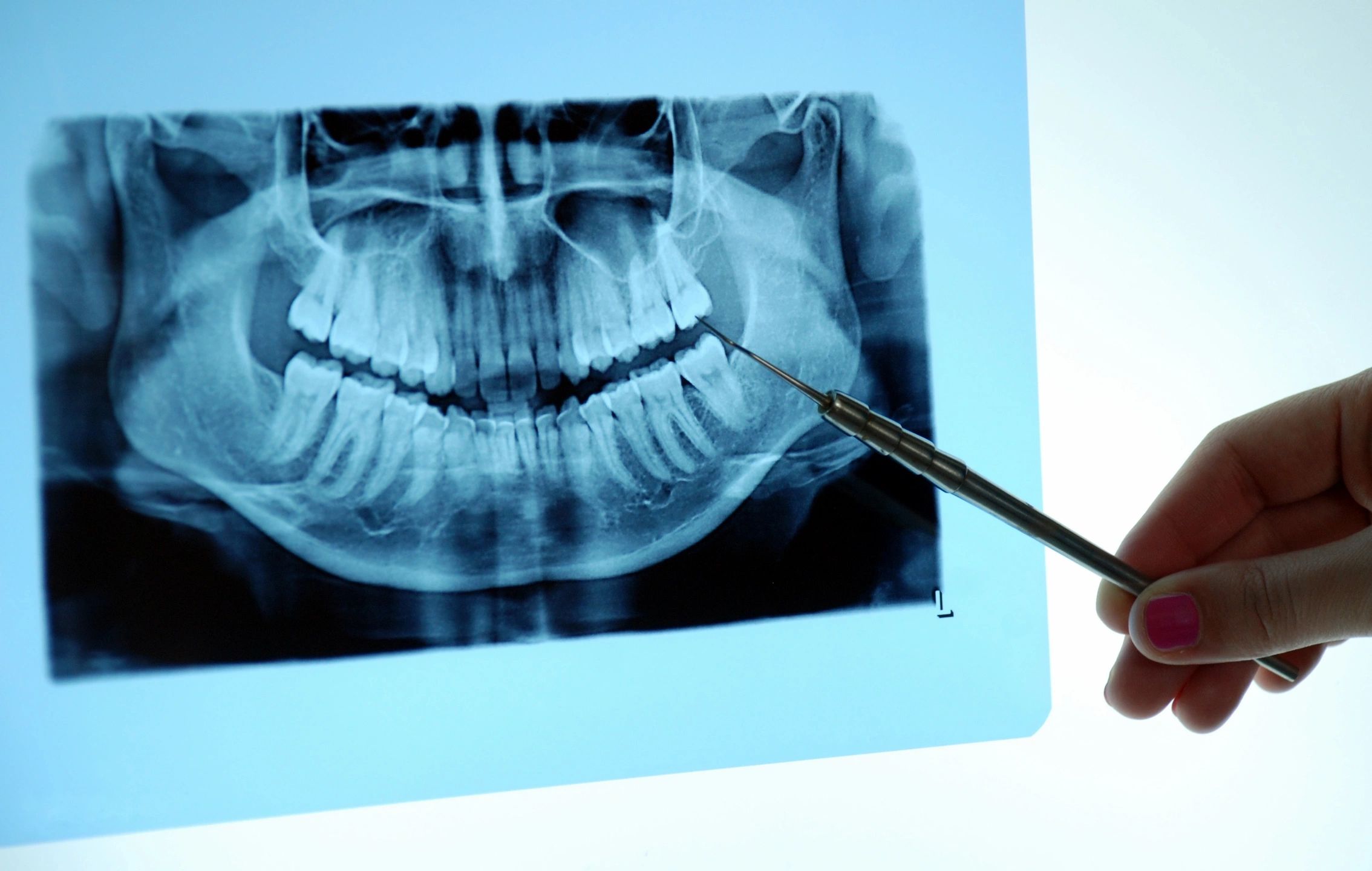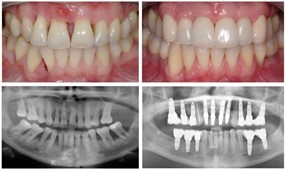Dental Bone Loss

Dental Bone Loss
Dr. Claire Arcidiacono, ND
Bone loss is a topic that every woman has heard of once they reach a certain age. However, men must also be concerned with bone loss! Typically, when most people think of bone loss they usually think of the hips or spinal area. However, bone loss in the mouth can and does occur. What can cause this bone loss? What are the signs of dental bone loss? And most importantly what can you do about it? Let us get into it, shall we?
To start with dental bone loss can occur in the teeth themselves. What happens is that there is a gradual loss of the bone portion of the tooth. In addition to losing bone in the teeth dental bone loss also refers to the deterioration of the bones that surround and support the teeth. Please see the attached pictures for before and after bone loss. (2)

What are the most common risk factors for dental bone loss? The most common cause for dental bone loss is gum disease! I have written a blog on gum disease, both periodontitis and gingivitis. So, for more information on this topic, I refer to that blog. Other risk factors include smoking, poor dental hygiene (including not receiving regular dental cleanings). Normally when you chew, bite, or even speak there is pressure applied to the teeth and their surrounding bones. This pressure will stimulate the repair and even strengthening of the bones. However, if you have a tooth removed for any reason this process does not occur and as a result the bone deteriorates. Thus, losing a tooth is a risk factor for dental bone loss. This is also why having bridgework or dentures can lead to dental bone loss. Certain trauma such as knocking out a tooth, cracking a tooth or even fracturing jaw bones can lead to dental bone loss. Even certain misalignments can lead to bone loss. For example, TMJ disorder, wisdom tooth eruption, general wear and tear and even having an over/under bite. (1) Poor nutrition as well as certain chronic conditions can increase the risk of dental bone loss. (2) If you have osteoporosis, when the bones become weak and brittle, you are at a higher risk of dental bone loss. Even certain tumors are a potential cause of dental bone loss. Osteomyelitis, which is inflammation in the bones can lead to dental bone loss. Certain prescription drugs can increase the risk of dental bone loss. (3) Having uncontrolled diabetes is also a risk for dental bone loss. Aging and age-related concerns can lead to dental bone loss. Lastly, tooth grinding is a significant risk factor as it wears away the teeth. (4)
What are the signs of dental bone loss? You may notice a change in the appearance of your teeth. For example, they may appear longer and thinner. You may notice bad breath. There may be receding gums. The teeth may feel as though they are unstable. (1) By unstable I mean you may notice that your teeth have begun to move, loosen, or even bleed. You may notice that your gums seem to “shrink.” Your gums may become swollen as well as start to bleed. There may be gaps between the teeth. (2)
What can you do to help reduce dental bone loss or even to reduce the risk of developing it?
- Maintain healthy dental health by performing routine dental care. For example, floss and brush your teeth every day! See your dentist for regular dental cleanings.
- Since smoking is a huge risk for dental bone loss, I recommend you quit smoking.
- It is also important to maintain control of any chronic disease you may have such as diabetes. As always it is important to maintain a healthy diet that is low in sugar and high in vegetables! (1,2)
- Vitamin D and calcium! Studies have found that using Vitamin D and calcium can reduce bone reabsorption and reduce the risk of fractures! (5) For Vitamin D and Calcium please see Invite’s Bone Powder and Calplex. For these nutrients individually please see D 1000 IU, 3000 IU and Calcium-Magnesium.
- Vitamin K has been found to help reduce bone loss! (6) Please see Invite’s K formula and Bone Powder.
- Strontium has been found to help reduce bone loss. (7) Please see Invite’s Strontium Citrate formula.
- Collagen has been found in studies to help reduce bone density. (8)
Our product highlight will focus on Strontium, what it does and how to take it!
Sources:
- https://www.kwcdental.com/blog/how-to-prevent-bone-loss-in-teeth
- https://www.advanceddentistry.co.uk/blog/rebuilding-bone-loss-in-gums/
- https://www.cccrdentistry.com/conditions/bone-loss-in-jaw/
- https://dfworalsurgeons.com/blog/dental-bone-loss/
- https://pmc.ncbi.nlm.nih.gov/articles/PMC9610653/#:~:text=Clinical%20studies%20have%20shown%20that,total%20calcium%20in%20the%20body.
- https://pubmed.ncbi.nlm.nih.gov/32060566/#:~:text=Effect%20of%20Low%2DDose%20Vitamin%20K2%20Supplementation%20on,and%20Elderly%20Chinese:%20A%20Randomized%20Controlled%20Study.&text=VK2%20supplementation%20in%20dose%20of%2090%20%C2%B5g/day,and%20vitamin%20D3%20brought%20no%20additional%20effects.
- https://www.sciencedirect.com/science/article/pii/S2666138123000142
- https://www.gelita.com/en/blog/amazingcollagen/collagen-peptides-missing-link-bone-health#:~:text=A%20study%20has%20shown%20that,increase%20in%20the%20femoral%20neck.&text=Additionally%2C%20changes%20in%20bone%20turnover,%2Dyear%20follow%2Dup%20study.
